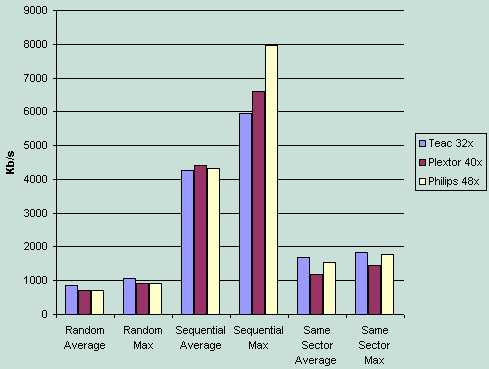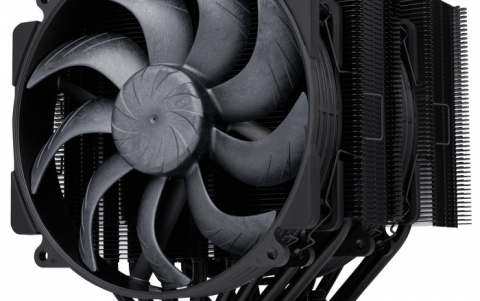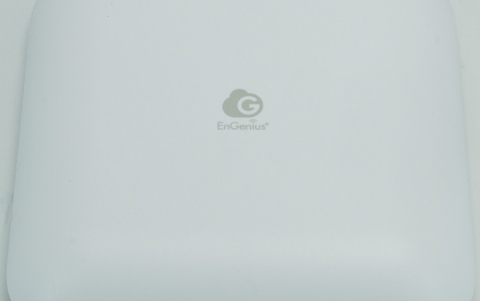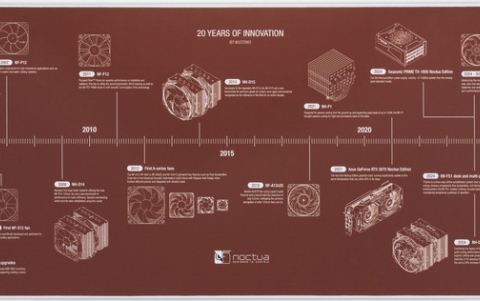Philips 48x CD-ROM
2. Data Tests
Philips (Aopen) 48x IDE CD Rom - Page 2
Data Tests
Test Machine:
ABIT BH6
Celeron 300A over clocked to 464 MHz
128 MB SDRAM PC 100
Quantum Fireball EX 6.4 GB UDMA
CL RivaTNT
CL AWE32
MS Windows 98 Build 4.10.2136
Teac 532E-A Firmware : v3.0a (with Auto Insert Notification & Sync transfer
off)
Plextor UltraPlex 40max, Firmware v1.01, (with Auto Insert Notification off
& Sync transfer on).
Test Method:
I used CD Speed 99 v0.2b & SCSI Mechanic v2.1e to run Data tests. Also
used CDRWin v3.7b & Fire Burner v0.85b to determine specific details. All
tests done with the same CD on every CD Rom.
CD Speed results: (Speed : Bigger is better, Seek Times : less is better, CPU Usage : less is better)
|
Speed (x) |
Seek Time (ms) |
CPU Usage (%) |
||||||||
|
Start |
Average |
End |
Random |
1/3 |
Full |
1x |
2x |
4x |
8x |
|
|
Teac 32x |
15.14 |
24.74 |
31.73 |
85 |
93 |
161 |
2 |
4 |
9 |
18 |
|
Plextor 40x |
18.65 |
31.62 |
41.90 |
87 |
89 |
126 |
2 |
3 |
7 |
14 |
|
Philips 48x |
21.52 |
35.29 |
48.44 |
87 |
138 |
202 |
1 |
2 |
2 |
5 |
The first comparison shows Plextor rules at seek time from his opponents. Philips seems faster as expected and with less CPU Usage. Teac seems to be somewhere middle.
SCSI Mechanic results:
|
Random I/O |
Sequential I/O |
Same Sector I/O |
|||||||
|
Min |
Average |
Max |
Min |
Average |
Max |
Min |
Average |
Max |
|
|
Teac 32x |
460 |
858 |
1056 |
923 |
4258 |
5951 |
643 |
1673 |
1847 |
|
Plextor 40x |
377 |
720 |
921 |
832 |
4417 |
6590 |
547 |
1178 |
1456 |
|
Philips 48x |
328 |
696 |
927 |
931 |
4329 |
7952 |
635 |
1541 |
1775 |

This test revealed several things such as if drive's succeed to reach their (supposedly) max speeds. The test showed that drive's can reach namely max speed but not sustain it for long time. Max speed is peek at (1) sec, not sustained data transfer rate. Average is close to reality. Teac here rules as (it has the smaller speed 32x which allows it to have less ppm and keep sustain data transfer rate). Plextor and Philips come behind. Now it is clearly speed isn't the main issue. When we use the drive we must look for the average data transfer rate. If the drive can sustain data transfer close to his namely max speed is good. If not.. then we must look for another drive.
CDRWin and Fire Burner results:
That was a surprise. Both programs detected some different features from
specifications (as the drive isn't capable of reading RW & CD+G CDs). More
Fire Burner reported that the drive has only 128 KB cache instead of 512 KB
(which Philips says.). So I tested missing features. The drive reads
RW CDs. (RW closed & open session). Didn't had a CD+G CD to test.













